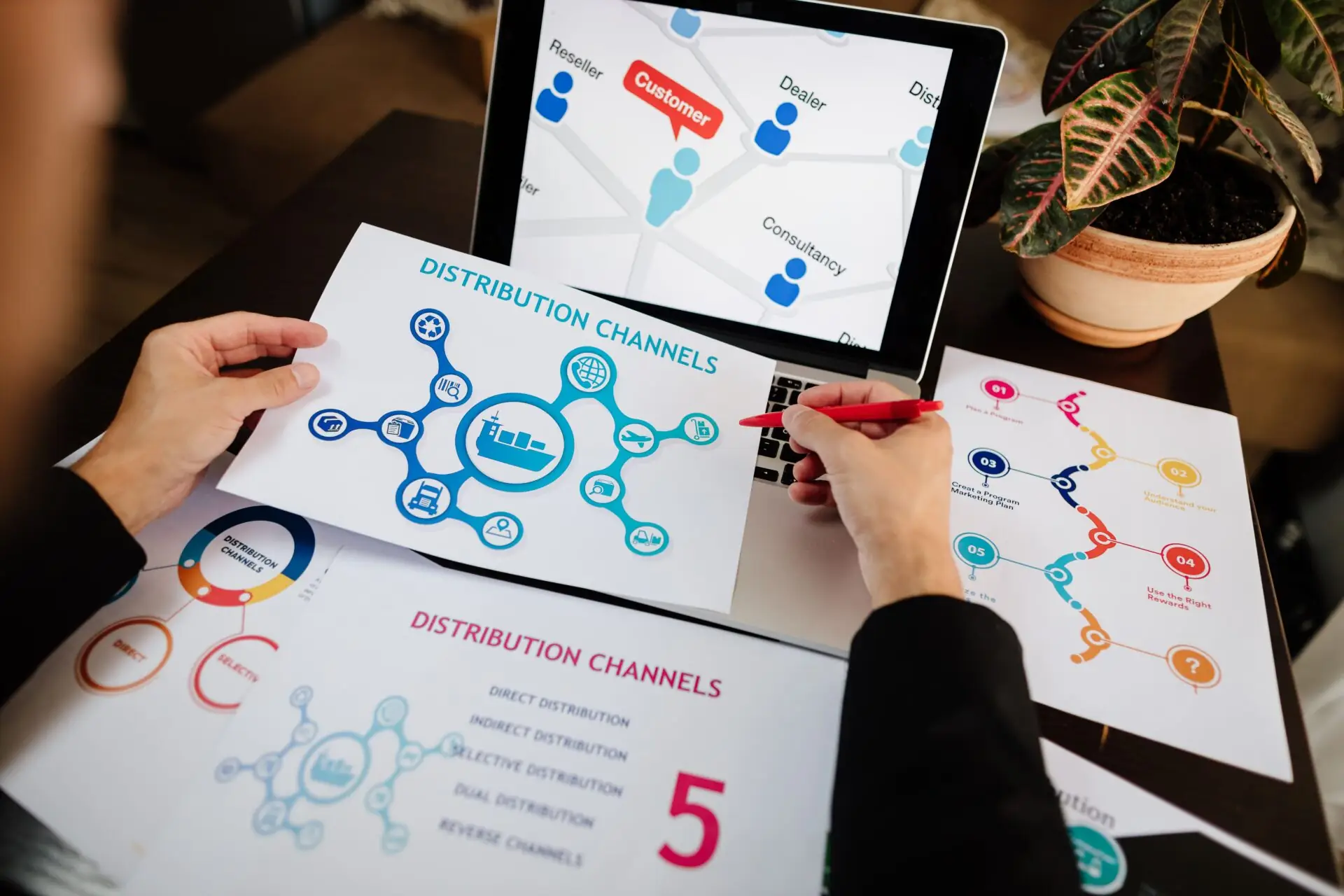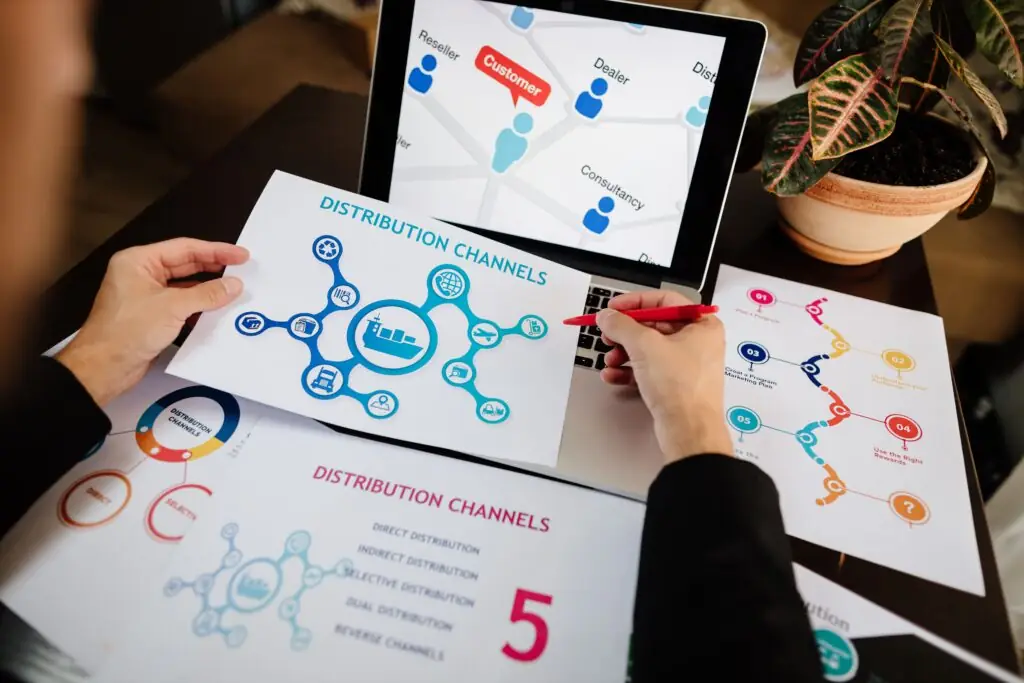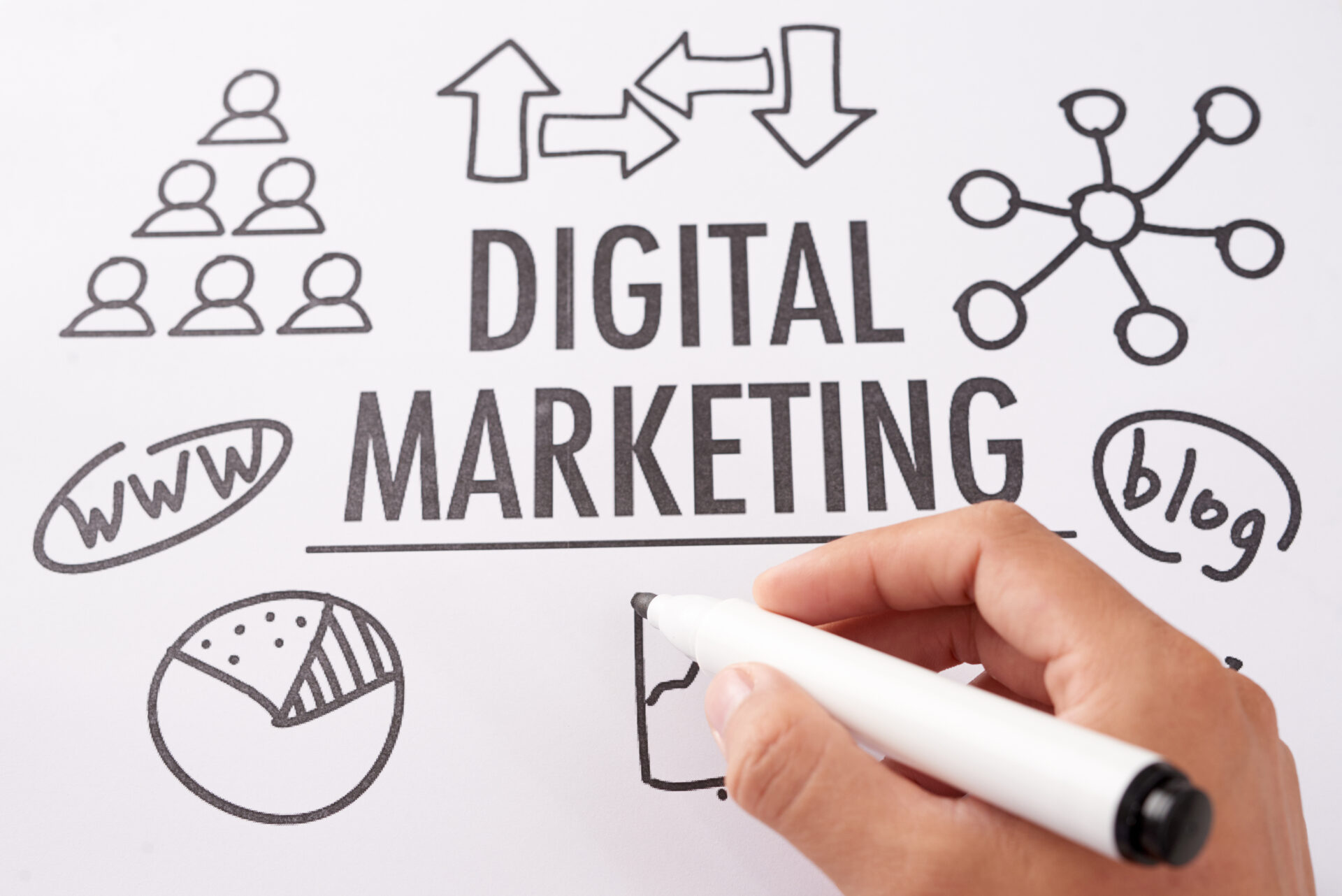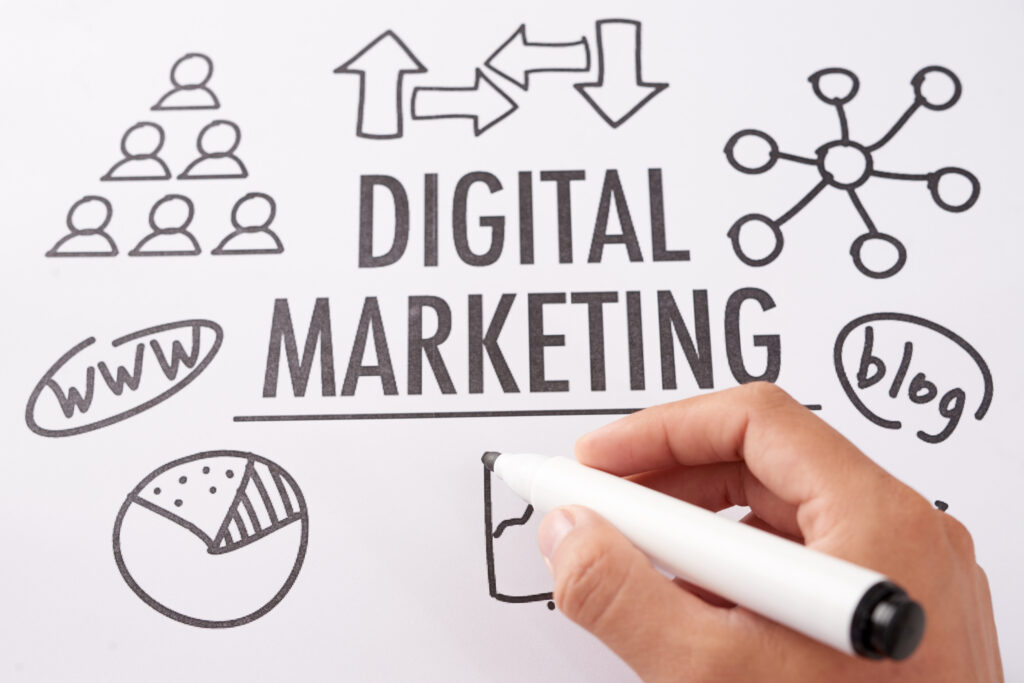What is Data Analysis?
Data analytics is the process of examining data sets to uncover patterns, trends, and insights that support decision-making. By leveraging specialised systems and software, organisations can transform raw data into valuable information. This field encompasses a range of techniques, including statistical analysis, predictive modelling, machine learning, and data mining—all designed to extract meaningful insights from large and complex data sets.
As businesses increasingly rely on data-driven strategies, mastering data analytics has become essential. Specialised programs, such as EDHEC’s Online Master of Science in Strategic Marketing and in Data Management & Business Analytics equip professionals with the skills to apply data analytics effectively through a comprehensive, case-based approach.
This article explores the fundamentals of data analytics, its significance, key methods, essential tools, and its impact across industries.

Evolution of Data Analytics
The evolution of data analytics has been driven by the exponential growth in data generation and advancements in technology. Initially focused on simple data analysis and reporting, data analytics has evolved to include complex techniques such as predictive analytics, machine learning, and big data analytics. This progression has enabled businesses to harness the power of data more effectively and make data-driven decisions.
The field has grown from basic statistical methods to incorporate sophisticated algorithms and artificial intelligence, making it possible to analyse massive data sets in real-time. Over the decades, data analytics has shifted from descriptive techniques that summarise historical data to advanced prescriptive and predictive methods that provide actionable insights and foresight.
The Role of Data Analytics in Business Intelligence
Data analytics plays a crucial role in business intelligence by providing insights that help organisations improve their operations and strategies. Through data analysis, businesses can understand market trends, customer behaviour, and operational efficiency, which are essential for informed decision-making and gaining a competitive edge.
Business intelligence relies heavily on data analytics to convert raw data into meaningful information, allowing companies to identify opportunities, predict market trends, and respond swiftly to changing conditions. By integrating data analytics into business intelligence systems, organisations can make more strategic decisions, improve operational efficiencies, and drive growth.
Want to build expertise in data analytics? Explore EDHEC’s online Master of Science programs designed to help professionals apply data insights to real-world business challenges.
MSc Strategic Marketing
MSc Data Management & Business Analytics
Importance of Data in Modern Business
The Importance of Data
Data is a critical asset for modern businesses, enabling them to gain insights and make informed decisions. The importance of data lies in its ability to provide a comprehensive view of business operations, customer interactions, and market dynamics.
By leveraging data, companies can identify opportunities for growth, optimise processes, and enhance customer satisfaction. The importance of data extends to every aspect of business, from strategic planning to daily operations, making it a cornerstone of modern business strategy. Organisations that effectively harness their data can better understand their customers, refine their marketing strategies, and improve their product offerings.
How Businesses Leverage Data
Businesses leverage data in various ways to drive performance and innovation. Data analytics is used to monitor Key Performance Indicators (KPIs), identify trends, and uncover hidden patterns. Companies utilise data for market research, product development, and customer relationship management, ensuring that their strategies are aligned with current market demands.
By analysing customer data, businesses can personalise marketing campaigns, improve customer service, and develop products that meet the specific needs of their target audience. Furthermore, data analytics can enhance supply chain management, streamline operations, and support risk management efforts. For example, a retail company might use data analytics to forecast demand for certain products, thus optimising inventory levels and reducing costs.
Data-Driven Decision Making
Data-driven decision-making involves using data analytics to inform and guide business decisions. This approach ensures that decisions are based on empirical evidence rather than intuition or guesswork. By adopting data-driven decision-making, businesses can reduce risks, improve accuracy, and achieve better outcomes. This method allows companies to react swiftly to market changes, anticipate customer needs, and fine-tune their strategies for maximum impact.
Beyond improving decision-making, this method fosters a culture of continuous improvement, where strategies are regularly evaluated, outcomes measured, and approaches refined over time. Companies like Amazon and Netflix exemplify this practice, using vast amounts of customer data to personalise experiences and optimise their services. The Online Master of Science in Strategic Marketing applies a data-driven approach to modern marketing, equipping professionals with the skills to make informed decisions at every level.
The Intersection of Information Technology and Data Analytics
The intersection of information technology (IT) and data analytics has revolutionised the way organisations handle data. IT provides the infrastructure and tools necessary for data collection, storage, and processing, while data analytics transforms this data into actionable insights. This synergy enables businesses to manage and analyse vast amounts of data efficiently.
The integration of IT and data analytics has led to the development of advanced systems that can process big data, providing real-time insights and supporting complex decision-making processes. IT advancements have made it possible to deploy sophisticated data analytics tools at scale, enabling organisations to derive insights from data more rapidly and accurately than ever before. Technologies such as cloud computing and distributed databases have further enhanced the capabilities of data analytics, making it more accessible and cost-effective for businesses of all sizes.
Key Data Analysis Methods
Descriptive Analytics
Descriptive analytics focuses on summarising historical data to understand past events. It uses statistical analysis and data visualisation techniques to present information in a clear and accessible format.
By providing a comprehensive view of past performance and trends, descriptive analytics helps businesses identify patterns and key insights. Often serving as the first step in the data analytics process, it lays the groundwork for more advanced methods.
Common tools and techniques used in descriptive analytics include:
- Dashboards – Interactive visual representations of key metrics
- Reports – Structured summaries of data insights
- Summary statistics – Averages, percentages, and other key indicators
- Data visualisations – Graphs, charts, and heatmaps for better interpretation
For instance, a sales dashboard might display trends over time, highlight peak sales periods, and compare performance against targets.
Diagnostic Analytics
Diagnostic analytics goes beyond descriptive analytics by examining the reasons behind past outcomes. It identifies correlations and patterns in data to uncover the causes of specific events, providing deeper insights into business operations. This type of analysis helps organisations understand why certain trends or patterns occurred, enabling them to address issues and improve performance.
Key techniques used in diagnostic analytics include:
- Root cause analysis – Identifies the fundamental reasons behind an issue
- Anomaly detection – Flags irregularities or unexpected patterns in data
- Drill-down analysis – Breaks down data into detailed components for deeper investigation
For example, a company might use diagnostic analytics to understand why sales declined in a particular region. By analysing data, they could uncover factors such as supply chain disruptions or changes in consumer behaviour, allowing them to take corrective action.
Predictive Analytics
Predictive analytics leverages statistical models and machine learning algorithms to forecast future events based on historical data. It helps businesses anticipate trends, identify potential risks, and make proactive decisions. By predicting future outcomes, organisations can allocate resources more effectively and develop strategies aligned with expected market conditions.
Predictive analytics is widely used across industries such as:
- Finance – Assessing credit risk and detecting fraudulent transactions
- Healthcare – Forecasting disease outbreaks and optimising patient care
- Marketing – Predicting customer behaviour and improving campaign targeting
Key techniques in predictive analytics include:
- Regression analysis – Identifies relationships between variables to forecast trends
- Time series analysis – Analyses patterns over time to predict future movements
- Classification algorithms – Categorises data to anticipate outcomes (e.g., customer churn prediction)
For example, banks use predictive analytics to assess credit risk by analysing historical data on loan repayments, helping them make informed lending decisions.
Prescriptive Analytics
Prescriptive analytics goes beyond predictive analytics by recommending specific actions to achieve desired outcomes. It combines data analysis with decision-making algorithms to suggest the best course of action, helping businesses optimise their strategies and operations.
Unlike predictive analytics, which forecasts future events, prescriptive analytics provides actionable guidance on how to respond. This makes it a powerful tool for strategic planning, allowing organisations to improve efficiency and achieve their goals more effectively.
Key techniques in prescriptive analytics include:
- Optimisation techniques – Identifies the most efficient solutions to a problem
- Simulation models – Tests different scenarios to determine the best approach
- Decision trees – Maps out possible actions and their potential outcomes
For example, a logistics company might use prescriptive analytics to determine the most efficient delivery routes, factoring in traffic patterns, fuel costs, and weather conditions to minimise delays and expenses.
Cohort Analysis
Cohort analysis involves grouping data based on shared characteristics and tracking how these groups (cohorts) behave over time. This method helps businesses understand customer lifecycles, engagement patterns, and retention rates, offering deeper insights than aggregate data alone.
Cohort analysis is widely used in:
- Marketing – Assessing customer engagement and campaign effectiveness
- Customer relationship management (CRM) – Understanding retention and churn rates
- Product development – Analysing user behaviour to improve features and services
By studying cohort behaviour, businesses can identify successful strategies and apply them to other groups. This granular approach helps uncover trends and patterns that may not be visible in general data analysis. For example, an e-commerce company might use cohort analysis to track the purchasing behaviour of customers who joined during a specific promotion. These insights can help refine future marketing strategies and improve customer retention.
Want to go beyond theory? Build hands-on expertise with real-world case studies in our specialised MSc programs.
MSc Strategic Marketing
MSc Data Management & Business Analytics

Tools and Technologies in Data Analytics
Overview of Data Analytics Tools
Data analytics tools are essential for processing, analysing, and visualising data. They enable businesses to extract meaningful insights from large data sets and support data-driven decision-making. These tools range from simple data visualisation platforms to advanced machine learning and statistical analysis software.
Key data analytics tools include:
- Power BI & Tableau – Interactive data visualisation and business intelligence platforms
- SQL – Database querying language for managing and retrieving structured data
- Python – Versatile programming language for data manipulation, automation, and machine learning
- R – Statistical computing language used for data analysis and visualisation
- Machine learning platforms – Tools like TensorFlow and Scikit-learn for predictive analytics and AI-driven insights
These tools offer functionalities such as data cleaning, transformation, advanced analytics, and visualisation, making them indispensable in modern business analytics workflows.
Power BI: Features and Benefits
Power BI, developed by Microsoft, is a powerful business analytics tool that provides interactive visualisations and business intelligence capabilities. It enables users to create detailed reports and dashboards, making data analysis more accessible and actionable.
Key Features of Power BI:
- Real-time data access – Connects to live data sources for up-to-date insights
- Robust data modelling – Allows complex data relationships and calculations
- Custom visualisation options – Enables the creation of tailored charts and graphs
- Seamless integration – Works with Microsoft products like Excel, Azure, and SharePoint
- Scalability – Handles large datasets efficiently for enterprise-level analysis
Benefits of Power BI:
- User-friendly interface – Requires minimal technical expertise to build dashboards
- Enhanced decision-making – Provides actionable insights for data-driven strategies
- Cloud and on-premise capabilities – Flexible deployment options to fit business needs
- Collaboration features – Enables teams to share reports and dashboards effortlessly
Power BI’s ability to process large datasets and provide real-time insights makes it a valuable asset for businesses aiming to maintain a competitive edge through data-driven decision-making.
Tableau: A Data Visualisation Tool
Tableau is a leading data visualisation platform designed to help users create interactive and shareable dashboards. It enables businesses to see, explore, and understand their data, making complex information more accessible.
Key Features of Tableau:
- Intuitive drag-and-drop interface – Allows users to create visualisations without coding
- Support for multiple data sources – Connects with databases, spreadsheets, and cloud services
- Advanced visualisation options – Offers heat maps, treemaps, and geospatial analysis
- Real-time data analysis – Provides up-to-the-minute insights for better decision-making
- Collaborative features – Teams can share reports and work together seamlessly
Benefits of Tableau:
- User-friendly – Designed for both beginners and advanced analysts
- Powerful analytics capabilities – Supports deep data exploration and trend analysis
- Customisation – Allows users to personalise dashboards for specific needs
- Scalability – Suitable for small businesses and large enterprises alike
Tableau’s strength lies in its ability to create complex visualisations without extensive programming knowledge, making it an ideal choice for organisations looking to enhance their data storytelling capabilities.
The Role of Machine Learning in Data Analytics
Machine learning, a subset of artificial intelligence, enables algorithms to learn from data and make predictions. In data analytics, it plays a crucial role in analysing large data sets, identifying patterns, and generating insights. By automating complex analytical tasks, machine learning enhances the accuracy, efficiency, and scalability of data analysis, allowing businesses to make more precise and data-driven decisions.
Key Benefits of Machine Learning in Data Analytics:
- Improved accuracy – Reduces human error and enhances predictive capabilities
- Automated insights – Identifies patterns that might be difficult to detect manually
- Scalability – Handles vast amounts of data efficiently
- Faster decision-making – Speeds up analysis and response times
Common Machine Learning Techniques:
- Supervised learning – Uses labeled data to make predictions (e.g., predicting customer churn)
- Unsupervised learning – Identifies hidden patterns or groups in data (e.g., discovering new customer segments)
- Reinforcement learning – Learns optimal actions through trial and error (e.g., AI-driven marketing recommendations)
For example, a business might use supervised learning to predict customer churn by analysing past behaviours, while unsupervised learning could help identify new customer segments based on purchasing patterns.
Big Data Technologies
Big data technologies refer to the tools and techniques used to process and analyse large and complex data sets. These technologies enable businesses to manage, store, and extract valuable insights from vast amounts of data efficiently.
Key Big Data Technologies:
- Hadoop – A distributed storage and processing framework for large-scale data
- Spark – A fast, in-memory processing engine for big data analytics
- NoSQL databases – Flexible, scalable databases designed for handling unstructured and semi-structured data
Benefits of Big Data Technologies:
- Scalability – Handles massive data volumes with distributed computing
- Real-time analytics – Processes and analyses data instantly for faster decision-making
- Integration capabilities – Supports diverse data sources, including structured, semi-structured, and unstructured data
- Enhanced business insights – Uncovers hidden patterns, optimises operations, and drives innovation
By leveraging big data technologies, organisations can gain a deeper understanding of their operations and markets, leading to more strategic and impactful decisions. These platforms are designed to handle the volume, velocity, and variety of data generated in today’s digital world, making them essential for businesses aiming to stay competitive.
Data Analytics in Practice
Data Analytics Process
The data analytics process consists of several key steps that transform raw data into actionable insights. By following a structured approach, businesses can ensure the accuracy, reliability, and effectiveness of their analysis.
Key Steps in the Data Analytics Process:
- Data Collection – Gathering relevant data from various sources (e.g., databases, APIs, surveys)
- Data Cleaning – Removing errors, inconsistencies, and missing values to ensure data quality
- Data Analysis – Applying statistical and machine learning techniques to extract insights
- Data Visualisation – Presenting findings in a clear, interactive format for better understanding
Additionally, continuous monitoring and refinement are essential to keep insights relevant and actionable over time.
Statistical Analysis in Data Analytics
Statistical analysis is a core component of data analytics, helping businesses interpret data distributions, identify correlations, and make predictions. It provides a foundation for more advanced analytical methods.
Common Statistical Analysis Techniques:
- Regression Analysis – Examines relationships between variables to predict trends
- Factor Analysis – Reduces large datasets into smaller factors to identify key influences
- Bayesian Inference – Applies probability to update predictions based on new data
- Hypothesis Testing – Evaluates assumptions to determine statistical significance
By leveraging these techniques, businesses can derive more accurate and reliable insights, supporting data-driven decision-making.
Data Mining Techniques
Data mining involves exploring large datasets to uncover patterns, relationships, and trends. It integrates statistics, machine learning, and database management to extract valuable insights.
Common Data Mining Techniques:
- Clustering – Groups similar data points together for segmentation (e.g., customer profiling)
- Association Rule Learning – Identifies relationships between items (e.g., product recommendations)
- Anomaly Detection – Recognises outliers that may indicate fraud or unusual activity
For example, a retailer might use association rule learning to identify frequently bought products and optimise cross-selling strategies.
Data Visualisation Techniques
Data visualisation helps present complex data in an easily understandable and visually engaging format. This step is crucial for effective communication and decision-making.
Popular Data Visualisation Tools:
- Tableau & Power BI – Interactive dashboards for dynamic data presentation
- Excel & Google Sheets – Basic charting tools for quick visual insights
Common Data Visualisation Techniques:
- Heat Maps – Displays intensity variations using colour coding
- Scatter Plots – Shows relationships between two numerical variables
- Network Diagrams – Visualises connections between data points
Advanced techniques such as interactive dashboards and 3D visualisations can enhance user engagement and depth of insights.
Examples of Data Analytics in Various Industries
Data analytics is applied across multiple industries to enhance decision-making, improve efficiency, and drive innovation. By analysing large datasets, businesses and organisations can gain valuable insights to optimise operations and deliver better outcomes.
Key Applications of Data Analytics by Industry:
- Healthcare – Analyses patient data to improve treatment outcomes and personalise care
- Example: Predictive analytics helps identify patients at risk of chronic conditions for early intervention
- Finance – Supports risk management, fraud detection, and investment decision-making
- Example: Banks use data analytics to detect fraudulent transactions and assess credit risk
- Marketing – Optimises campaigns by analysing customer behaviour and market trends
- Example: Businesses personalise marketing messages based on purchasing habits and engagement patterns
- Retail – Enhances inventory management, demand forecasting, and customer experience
- Example: Retailers use data analytics to predict seasonal demand and personalise recommendations
- Transportation & Logistics – Improves route planning, fleet management, and delivery efficiency
- Example: Logistics companies analyse traffic data to optimise delivery routes and reduce costs
- Energy – Supports predictive maintenance, energy consumption analysis, and efficiency improvements
- Example: Energy providers use data analytics to monitor usage patterns and optimise grid performance
Each of these applications highlights the versatility and impact of data analytics in transforming industries and enhancing operational efficiency.
Whether you’re passionate about marketing, finance, or tech-driven innovation, EDHEC’s specialised online Master of Science programs equip you with the right skills and training to thrive.
MSc Strategic Marketing
MSc Data Management & Business Analytics
How Do Data Analytics and Artificial Intelligence Integrate?
AI enhances data analytics by automating and improving data processing, leading to deeper insights. This integration:
- Speeds up data analysis – AI processes large datasets efficiently
- Enhances predictive modeling – Machine learning improves forecasting accuracy
- Uncovers hidden patterns – AI detects trends not easily visible through traditional analysis
- Automates decision-making – AI-driven analytics supports real-time business decisions
For example, AI-powered tools can detect fraud, personalise customer experiences, and optimise supply chain operations, making businesses more efficient and data-driven.
Careers in Data Analytics
Is Data Analytics a Good Career?
Yes, a career in data analytics is highly rewarding due to:
- Strong job demand – Businesses across industries need data professionals
- Competitive salaries – Data roles offer lucrative pay
- Diverse opportunities – Work in marketing, finance, healthcare, tech, and more
- Professional growth – Opportunities to advance into leadership positions
- Transferable skills – Data analytics expertise is valuable across industries
The field is constantly evolving, ensuring continued growth and innovation.
Overview of Career Opportunities
A career in data analytics offers numerous opportunities for growth and development. With the rising demand for data-driven decision-making, professionals in this field are highly sought after. Key roles include:
- Data Analyst – Focuses on interpreting data and providing actionable insights
- Data Scientist – Develops predictive models and machine learning algorithms
- Business Analyst – Bridges the gap between data analysis and business strategy
The expansion of data-driven technologies ensures a steady demand for skilled professionals. Additionally, career paths in data analytics can lead to senior leadership positions, such as Chief Data Officer (CDO), and Head of Data Science.
These positions offer significant career advancement opportunities for those with strong analytical skills and business acumen.
Roles and Responsibilities of a Data Analyst
A data analyst is responsible for collecting, processing, and analysing data to extract meaningful insights. Their role includes:
- Data cleaning – Ensuring accuracy and consistency in datasets
- Statistical analysis – Identifying trends, patterns, and correlations
- Data visualisation – Presenting insights through dashboards and reports
- Reporting – Communicating findings to business stakeholders
Data analysts play a crucial role in helping businesses optimise operations and make data-driven decisions. They work closely with business teams to translate data into actionable strategies.
The Difference Between Data Scientists and Data Analysts
While both data analysts and data scientists work with data, their roles differ in focus, complexity, and skill set.
- Focus & Responsibilities:
- Data analysts interpret data to provide actionable insights that support business decisions. They focus on data cleaning, visualisation, and reporting.
- Data scientists, on the other hand, develop predictive models and machine learning algorithms to uncover deeper patterns and automate decision-making processes.
- Skill Sets & Techniques:
- Data analysts typically work with tools like SQL, Excel, Tableau, and Power BI to analyse and present data. Their work involves statistical analysis, trend identification, and performance tracking.
- Data scientists use programming languages such as Python and R, along with machine learning frameworks, to build models that predict outcomes and detect complex patterns in data.
- Types of Analysis:
- Data analysts focus on operational and strategic reporting, helping organisations optimise current processes.
- Data scientists engage in exploratory and predictive analysis, working on AI-driven solutions and experimental models.
- Interaction with Stakeholders:
- Data analysts collaborate closely with business teams to deliver insights that inform decisions.
- Data scientists work with engineers, analysts, and executives to develop scalable data-driven solutions.
While data analysts provide insights based on historical data, data scientists take it a step further by developing models that forecast future trends and automate data-driven decisions.
Skills Required for a Career in Data Analytics
A career in data analytics requires a blend of technical, analytical, and business skills, including:
Technical Skills:
- Statistical Analysis: Proficiency in statistical methods and tools.
- Data Visualisation: Ability to present data in a visual format.
- Programming Languages: Knowledge of languages such as Python and R.
- Database Management: Skills in managing and querying large databases using SQL or other database technologies.
- Machine Learning: Understanding of machine learning algorithms and their applications in data analysis.
Analytical and Soft Skills:
- Critical Thinking: Ability to analyse data and draw meaningful conclusions.
- Communication Skills: Ability to communicate insights effectively to stakeholders.
- Problem-Solving: Aptitude for identifying and addressing business problems using data-driven approaches.
- Data Management: Knowledge of data governance, data quality, and data integration techniques.
- Business Acumen: Understanding of business operations and the ability to align data insights with business strategies.
Mastering these skills opens the door to various career opportunities and enables professionals to adapt to evolving industry demands.
Entry-Level Data Analytics Positions
Entry-level positions provide a strong foundation for a career in data analytics. These roles typically involve data collection, cleaning, and basic analysis, offering valuable hands-on experience.
Common Entry-Level Roles:
- Junior Data Analyst – Assists with data preparation, visualisation, and reporting
- Data Technician – Supports data processing and database management
- Business Intelligence (BI) Analyst – Works on dashboard creation and KPI monitoring
Entry-level analysts often work on real-world data problems, collaborate with senior professionals, and gain exposure to more advanced analytics techniques over time. These roles serve as a stepping stone to higher-level positions in the field.
What Are the Different Data Analytics Positions Available?
There are various positions available in data analytics, including:
- Data Analyst – Interprets data and provides actionable insights
- Data Scientist – Develops models and algorithms for advanced analysis
- Business Analyst – Bridges the gap between data and business strategy
- Data Engineer – Builds and maintains data infrastructure
- Data Architect – Designs large-scale data management systems
Each of these roles plays a critical part in the data analytics ecosystem, enabling organisations to leverage data effectively. At the senior level, positions such as Chief Data Officer (CDO) or Head of Analytics involve strategic leadership and oversight, ensuring data initiatives align with business objectives and drive innovation

Advance Your Career with EDHEC’s Specialised Degrees
A specialised degree can equip you with the technical expertise and strategic insights needed to thrive in the dynamic field of data analytics. EDHEC’s online and on-campus programs are designed to provide cutting-edge knowledge, hands-on experience, and industry-relevant skills:
- Online MSc in Strategic Marketing: This 15-month program integrates traditional marketing principles with advanced data analytics, consumer psychology, and business intelligence. Designed for professionals aiming to lead impactful marketing strategies, it offers a flexible learning environment to master data-driven decision-making.
- Online MSc in Data Management & Business Analytics: This 18-month program focuses on developing strong analytical skills for managing and interpreting data. It covers areas such as data management, business analytics, and decision support systems, equipping professionals to harness data for strategic advantage.
- MSc in Data Analytics & Artificial Intelligence: This comprehensive program hones your business decision-making skills by equipping you with the ability to implement, use, and monitor new disruptive technologies. It prepares graduates for roles requiring programming, quantitative analysis, critical thinking, and business management skills.
Embracing the Power of Data Analytics
Data analytics is a strategic discipline that enables businesses to make data-driven decisions, optimise operations, and gain a competitive edge. By understanding the importance of data, leveraging key analysis methods, and utilising advanced tools and technologies, organisations can transform raw data into valuable insights.
Whether you are looking to enhance your current role or explore new career opportunities, mastering data analytics is essential in today’s data-driven world. The future of business lies in the ability to harness data effectively, and professionals skilled in data analytics are at the forefront of this transformation.
Programs such as the Online MSc in Strategic Marketing, Online MSc in Data Management & Business Analytics, and MSc in Data Analytics & Artificial Intelligence provide the expertise needed to succeed in this evolving field.


























































































